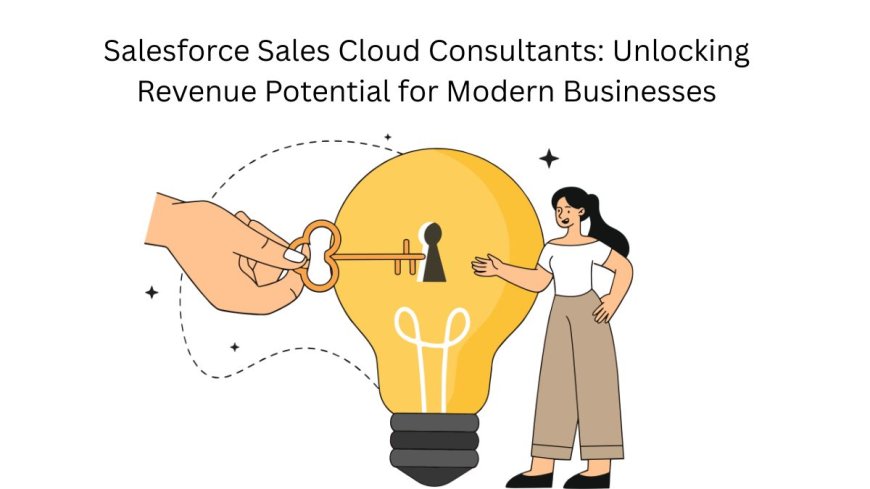Salesforce Sales Cloud Consultants: Unlocking Revenue Potential for Modern Businesses
Salesforce Sales Cloud Consultants are certified experts who specialize in implementing, customizing, and optimizing Sales Cloud for businesses of all sizes.

Sales teams are under constant pressure to achieve more in less time while adapting to ever-evolving customer expectations. As sales processes become increasingly complex, the demand for smart, scalable solutions has surged. Enter Salesforce Sales Cloud—one of the most powerful tools for sales automation and revenue acceleration. But the platform’s true potential is only unlocked when guided by expert hands. That’s where Salesforce Experts come in.
These professionals bridge the gap between technology and business strategy, helping organizations harness Sales Cloud not just as a CRM, but as a revenue-generating engine. From streamlining lead management to optimizing pipelines and enabling forecasting precision, Sales Cloud consultants help businesses elevate performance on every front.
Understanding the Core of Sales Cloud
Sales Cloud is a customer relationship management solution designed to support the full spectrum of sales activities—prospecting, lead nurturing, opportunity management, quoting, and closing deals. Built on the Salesforce platform, it integrates AI, automation, and real-time analytics to deliver insights and workflows that empower sales teams.
But the solution is more than just a repository of contacts and activities. It’s an intelligent framework for managing customer relationships at scale. The platform enables businesses to personalize engagement, prioritize leads, align sales and marketing, and shorten the sales cycle.
However, the system’s vast capabilities can be underutilized or misaligned without expert configuration. This is where specialized consultants offer a critical advantage.
Who Are Salesforce Sales Cloud Consultants?
Salesforce Sales Cloud Consultants are certified experts who specialize in implementing, customizing, and optimizing Sales Cloud for businesses of all sizes. They possess both deep product knowledge and a strong understanding of sales processes across industries. Their role goes far beyond technical implementation—they provide strategic consultation on how to design workflows, define KPIs, structure data, and integrate tools in a way that drives business value.
Typically, these consultants engage across various stages:
-
Discovery and analysis: Assessing current sales processes, systems, and pain points.
-
Design and architecture: Crafting custom solutions that align with business goals.
-
Implementation and customization: Configuring Sales Cloud features to support workflows.
-
Training and enablement: Ensuring teams can effectively use the tools provided.
-
Ongoing optimization: Analyzing performance data and refining processes.
By focusing on both the system and its users, consultants help organizations extract measurable ROI from their Salesforce investment.
The Strategic Impact of Sales Cloud Consultants
Sales Cloud consultants bring a unique blend of operational insight and technical expertise, which enables them to address several mission-critical aspects of revenue generation:
1. Sales Process Optimization
Many sales organizations suffer from inconsistent practices, redundant manual tasks, or underutilized CRM features. Consultants work to map, standardize, and optimize the sales process from lead capture to closure. By automating repetitive steps and introducing intelligent workflows, they free up sales reps to focus on what matters—selling.
They also introduce best practices in areas such as lead scoring, pipeline visibility, and opportunity stages, ensuring that each interaction is purposeful and moves deals forward.
2. Customization for Unique Business Needs
Every business has distinct sales models, industry requirements, and customer expectations. Sales Cloud consultants tailor the platform to reflect these nuances. This could include custom fields, record types, validation rules, or approval processes that align precisely with internal operations.
Such deep-level customization ensures that Sales Cloud becomes a true extension of the business—rather than a generic system that users have to work around.
3. Improved Forecasting and Reporting
Accurate forecasting is the backbone of strategic planning. Sales Cloud provides built-in tools for real-time forecasting, but without proper configuration, the data may be incomplete or misleading. Consultants ensure data hygiene, establish forecasting models, and create dashboards that surface key insights.
From tracking quotas and conversion rates to identifying bottlenecks, consultants transform raw data into actionable intelligence that informs both tactical decisions and long-term strategy.
4. Seamless Integration Ecosystem
Sales Cloud rarely operates in isolation. Modern businesses rely on a range of platforms—marketing automation, ERP, customer service, and more. Consultants ensure that Sales Cloud integrates seamlessly with existing systems, enabling data to flow across departments and support unified customer experiences.
This interconnectedness reduces silos and enhances collaboration across sales, marketing, finance, and support teams—ultimately driving a more holistic revenue strategy.
5. User Adoption and Enablement
Even the most sophisticated Salesforce setup can fail without proper adoption. Sales Cloud consultants focus on designing user-friendly interfaces, automating time-consuming tasks, and providing training that resonates with the specific needs of each role.
They help cultivate a culture of CRM usage by ensuring the platform delivers immediate value to end-users, reducing friction and increasing long-term engagement.
Unlocking Growth through Data and AI
One of the most powerful differentiators of Sales Cloud is its ability to harness artificial intelligence through Salesforce Einstein. However, deriving value from AI requires more than flipping a switch. Consultants help prepare the data infrastructure and business rules that allow Einstein to deliver meaningful insights—such as next-best actions, lead conversion predictions, and win probability scores.
This data-driven decision-making fosters a proactive sales culture where reps can prioritize the right opportunities and managers can coach effectively based on real-time performance trends.
Accelerating Time-to-Value
Organizations often underestimate the complexity of deploying and optimizing Sales Cloud. DIY implementations can lead to misconfigurations, inefficient processes, and delayed ROI. Consultants drastically reduce this risk by accelerating the time-to-value of the platform.
With proven methodologies, agile deployment models, and deep platform knowledge, they help organizations reach their revenue goals faster—while avoiding common pitfalls and rework.
Strategic Guidance Beyond the Launch
The relationship with a Sales Cloud consultant doesn’t end at go-live. These experts continuously analyze performance metrics, adapt systems to changing business needs, and introduce new features as the platform evolves. Whether it's incorporating CPQ (Configure, Price, Quote), deploying mobile sales capabilities, or aligning with new go-to-market strategies, consultants ensure that Salesforce remains a dynamic, future-ready asset.
Conclusion
Maximizing the impact of Salesforce Sales Cloud requires more than basic implementation. It demands a thoughtful blend of business acumen, technical skill, and continuous improvement. Salesforce Sales Cloud Consultants are the linchpin in this equation.
By aligning the capabilities of the platform with strategic sales objectives, they help businesses unlock new levels of efficiency, insight, and growth. From fine-tuning workflows to harnessing AI-driven forecasts, these consultants turn a powerful CRM into a revenue transformation engine.
For organizations aiming not just to manage relationships, but to master them, the partnership with a Sales Cloud consultant is not a luxury—it’s a strategic necessity.






















































































































































